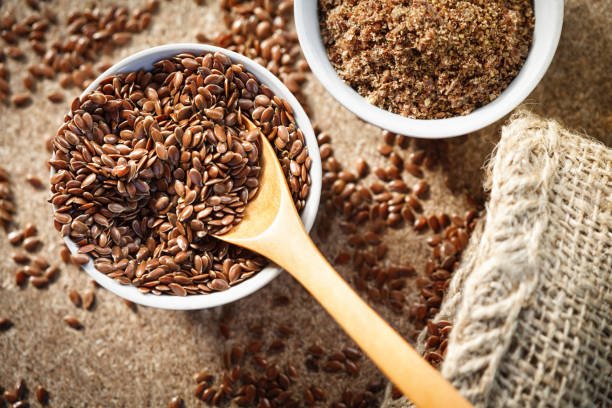Flax Seeds
Flax seeds are small, flat, and oval-shaped seeds, typically brown, golden, or tan in color. They have a smooth, shiny surface and a hard outer shell. The seeds are known for their nutty flavor and are often consumed in their whole, ground, or oil forms. Flax seeds are rich in omega-3 fatty acids, fiber, and lignans, making them highly valued for their health benefits, particularly for heart health, digestive health, and as a source of plant-based protein.
1. Size and Shape: Flax seeds are small, oval-shaped, measuring about 4–7 mm in length.
2. Color:They can be brown or golden, depending on the variety.
3. Texture: The seeds have a smooth, shiny outer surface and a hard, firm shell.
4. Weight: Flax seeds are lightweight, with a low bulk density, making them easy to handle and package.
5. Aroma and Flavor: When whole, flax seeds have a mild, nutty flavor. When ground, they release a slightly more pronounced earthy aroma.
6. Surface Characteristics: Flax seeds have a smooth and glossy appearance on the surface due to the natural oils contained within.
1. Omega-3 Fatty Acids:Flax seeds are an excellent source of alpha-linolenic acid (ALA), a type of omega-3 fatty acid, which has anti-inflammatory and heart-health benefits.
2. Lignans:Flax seeds are rich in lignans, which are phytoestrogens known for their antioxidant properties and potential to support hormonal balance and reduce the risk of certain cancers.
3. Proteins :Flax seeds contain a moderate amount of plant-based protein (about 20–25%), making them a good source of protein for vegetarians and vegans.
4. Fiber :Flax seeds are high in dietary fiber, both soluble and insoluble, which aids digestion and helps maintain healthy cholesterol levels.
5. Vitamins and Minerals :Flax seeds contain vitamins B1 (thiamine), B2 (riboflavin), B3 (niacin), and folate. They are also a good source of minerals such as magnesium, phosphorus, potassium, and iron.
6. Amino Acids :Flax seeds contain a variety of essential amino acids, making them a valuable source of complete protein when combined with other plant-based proteins.
7. Fatty Acids :Apart from omega-3 fatty acids, flax seeds contain small amounts of omega-6 fatty acids
Nutritional Value Seeds (per 100 grams)
Calories: 534 kcal
Protein: 18.3 g
Total Fat: 42.2 g
Saturated Fat: 3.7 g
Monounsaturated Fat: 7.5 g
Polyunsaturated Fat: 28.7 g
Omega-3 (Alpha-Linolenic Acid): 22.8 g
Omega-6 (Linoleic Acid): 5.9 g
Carbohydrates: 28.9 g
Dietary Fiber: 27.3 g
Sugars: 1.6 g
Vitamins: Vitamin B1 (Thiamine): 1.6 mg-Vitamin B2 (Riboflavin): 0.2 mg-Vitamin B3 (Niacin): 3.1 mg-Vitamin B6: 0.5 mg-Folate (Vitamin B9): 87 mcg-Vitamin E: 0.3 mg
Minerals: Calcium: 255 mg-Iron: 5.7 mg- Magnesium: 392 mg
“Compliant with local and European standards according to food safety regulations.”
1. Purity: Flax seeds should be at least 98-99% pure, free from foreign matter, other seeds, and contaminants.
2. Moisture Content: The moisture content of flax seeds should not exceed 8-10% to prevent spoilage, mold growth, and deterioration during storage.
3. Size and Shape: Flax seeds should be uniform in size and shape to ensure consistency in packaging and product quality.
4. Color and Appearance: The seeds should have a brown or golden color, depending on the variety, and should not show any signs of discoloration, mold, or physical damage.
5. Odor and Flavor: Flax seeds should have a mild, nutty aroma. They should not have any off-odors or signs of rancidity, which may occur if the seeds are improperly stored.
6. Foreign Matter: The presence of foreign matter, such as stones, dirt, or other seeds, should be minimal—generally, foreign matter should not exceed 0.5%.
7. Pest-Free :Flax seeds must be free from pests, insects, and any visible signs of contamination.
8. Aflatoxins and Mycotoxins: Flax seeds should meet international safety limits for mycotoxins such as aflatoxins. Levels should be below the regulatory limits set by food
1. Total Plate Count (TPC): The total microbial load should not exceed 1 × 10⁴ CFU/g. This ensures the seeds are free from excessive bacteria and fungi, maintaining their quality and safety
2. Yeast and Mold Count: The count of yeast and molds should be <1 × 10³ CFU/g to ensure that the seeds are not contaminated with molds or yeasts that could affect quality and safety.
3. Coliform Bacteria: Coliform bacteria should be absent or present in minimal levels, ideally <10 CFU/g, indicating proper handling and hygiene during processing.
4. Escherichia coli (E. coli): E. coli should be absent in 1g of seeds. The presence of E. coli is a significant health concern and is considered a critical contamination factor.
5. Salmonella spp.: Salmonella should be absent in 25g of seeds. Salmonella is a pathogenic bacterium that can cause foodborne illnesses, so it must be completely absent in food-grade seeds.
6. Aflatoxins (B1, B2, G1, G2): The levels of aflatoxins (a type of mycotoxin) must meet international standards and be below the regulatory limits
7-Pathogenic Bacteria: Flax seeds should be free from pathogenic bacteria like Listeria monocytogenes and Campylobacter, which could cause severe health issues if consumed
1. Packaging:
As per the customer’s request, polypropylene bags and cartons.”
2. Storage: Temperature: Flax seeds should be stored in a cool, dry environment, ideally at temperatures between 15-20°C (59-68°F). Avoid exposure
Shelf Life ;
Flax seeds have a shelf life of approximately 1 to 2 years when stored properly. To maintain their quality, they should be stored in a cool, dry, and airtight environment at temperatures between 15–20°C (59–68°F) and relative humidity levels below 60%. If stored in these conditions, flax seeds will retain their nutritional value, including omega-3 fatty acids and antioxidants. It is important to use the First In, First Out (FIFO) method to ensure that older stocks are used first and to prevent any deterioration of the seeds over time.
Traceability and Compliance;
Origin :Egypt
Contact information:


